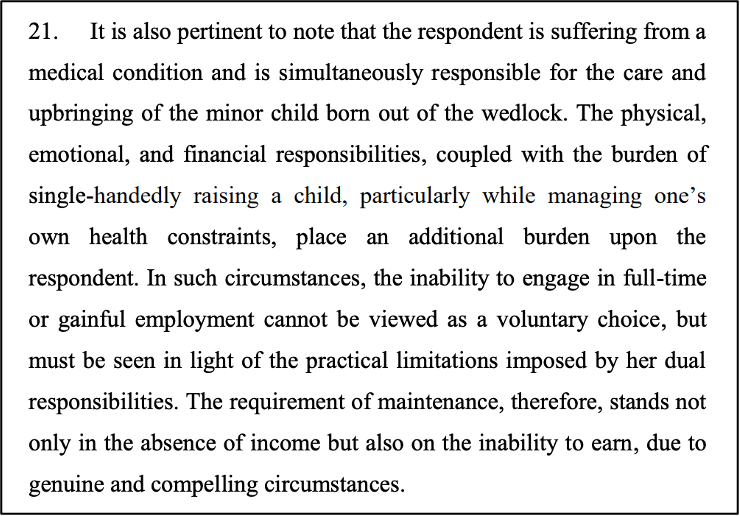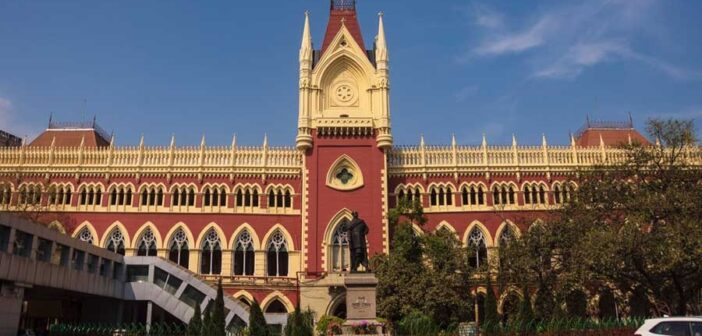In this edition of court judgments review, we look at Delhi HC’s order that quashed a case involving misuse of private images at complainant’s request, emphasising her right to privacy, dignity, and closure, that EMIs and mediclaim policy payment cannot override husband’s legal duty to maintain the wife and child. Kolkata’s HC order that injury is not essential to prove negligence in a dog attack case.
Delhi HC: Quashes case involving misuse of private images at complainant’s request, emphasising her right to privacy, dignity, and closure
The case, X vs Y, concerns a petition filed under Section 528 of the Bharatiya Nagarik Suraksha Sanhita (BNSS), 2023 (formerly Section 482 CrPC), seeking quashing an FIR registered in 2019. The FIR was lodged under Sections 354, 354C, 506, 509, 384, and 34 of the IPC and Section 12 of the POCSO Act, following allegations of sexual harassment and extortion by the Petitioner against a schoolmate.
The complainant, a minor at the time, had developed a personal relationship with the Petitioner in 2016. Over time, the Petitioner allegedly pressured her (the complainant) to share private photographs, which she eventually did. After they stopped communicating in 2017, the Petitioner contacted her in 2018 and demanded money, threatening to release the photos if she did not comply. A friend of the petitioner, a child in conflict with the law (CCL), also began blackmailing her using the same photographs. The extortion continued until the complainant’s mother discovered the threats, leading to the lodging of the FIR in 2019.
The case had progressed to the stage where charges were framed, and the complainant’s statement was partly recorded. However, during the pendency of the proceedings, both parties entered into a voluntary settlement. The complainant, now an adult, appeared before the Court and expressed her desire to move on, citing social stigma and impediments to her matrimonial prospects.
While noting the seriousness of the allegations, Justice Sanjeev Narula of the Delhi High Court quashed the FIR in light of the complainant’s express wishes, prioritising her right to privacy and closure. Conditions imposed included a binding undertaking by the Petitioner, one month of community service at Lok Nayak Hospital, a cost of Rs. 50,000 towards the Army Welfare Fund, and a strict no-contact order with the complainant. The petition was accordingly disposed of.
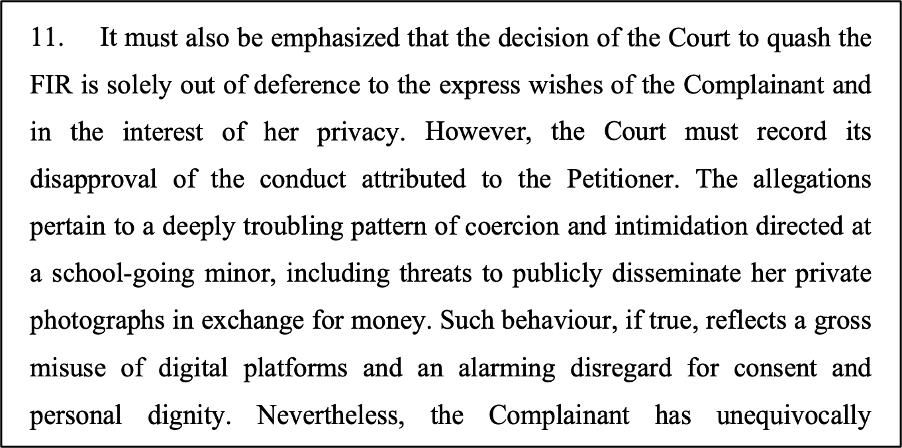
Kerala HC: The law cannot remain static, but has to evolve with the changes in the society and the life style of members of the society
In the case, Zahhad and Others vs. State of Kerala and Others, the petitioner is a trans-man and had given birth to a child with their partner, a trans-woman. But the Kozhikode Corporation issued the birth certificate with the trans-woman listed as the father and the petitioner as the mother. The couple argued that the existing designation did not reflect their true gender identities and could cause difficulties for their child in education, employment, and other areas.
The Kozhikode Corporation refused to amend the certificate, stating that it must follow the format prescribed under the Kerala Registration of Births and Deaths Rules, 1999, which only recognises binary gender terms “father” and “mother.” The petitioners contended that the law should evolve to reflect societal changes and accommodate transgender identities. They argued that the inability to amend official documents to reflect their gender identities infringed on their constitutional rights and could negatively impact their child’s future.
Justice Ziyad Rahman of the Kerala High Court observed that the law cannot remain static but must evolve in line with societal changes and the diverse lifestyles of its members. The Court noted that the Registration of Births and Deaths Act, 1969, and its rules were framed with a binary understanding of gender, which is outdated in light of recent Supreme Court judgments recognising transgender rights and the Transgender Persons (Protection of Rights) Act, 2019. However, the Court clarified that this was a rare and exceptional case and refused to alter the statutory format of birth certificates generally. Stating this, the Court allowed the petition and directed the Kozhikode Corporation to issue a revised birth certificate listing the petitioner and their partner as “parents” instead of “father” and “mother,” within two months.
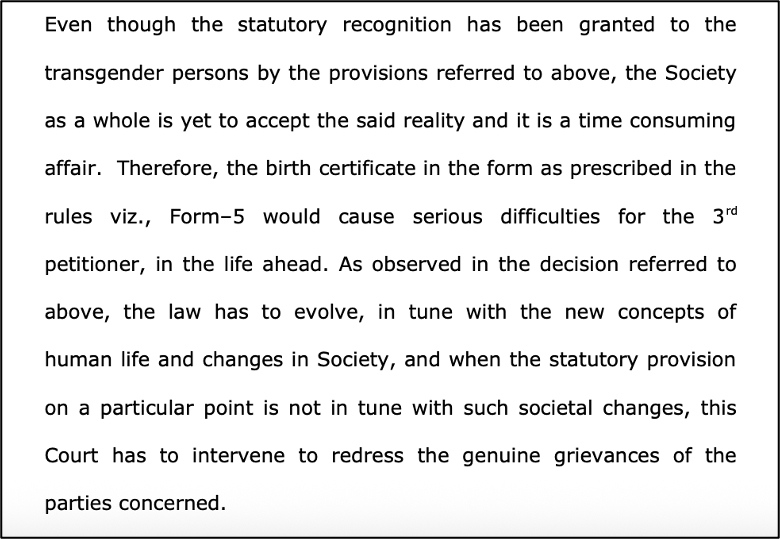
Allahabad HC: Divorce by mutual consent can be granted within a year if the marriage has broken down irreparably, and continued litigation will cause mental and physical harassment
The appellant and respondent in the case, Angad Soni vs. Arpita Yadav, were married in August and September 2024, but their relationship quickly turned hostile. The appellant feared false complaints, while the respondent filed multiple FIRs against him, including one under serious charges like rape (Section 376 IPC) and the POCSO Act. Attempts at mediation failed, and both parties agreed to end the marriage. They jointly filed a divorce petition under Section 13-B of the Hindu Marriage Act, along with an application under Section 14 to waive the one-year waiting period required before filing for divorce.
The appellant argued that Section 14 allows courts to permit divorce within a year if there’s evidence of exceptional hardship or depravity. He cited decisions from various High Courts where this exception had been applied. The respondent supported the request, saying both parties wished to move on peacefully and avoid further emotional strain from ongoing litigation.
The Allahabad High Court found that the marriage had broken down irreparably and that continuing the legal process would only worsen the parties’ distress. The bench of Justice Vivek Chaudhary and Justice Brij Raj Singh noted that the conditions for making an exception under Section 14 were met due to the criminal complaints and lack of reconciliation.
The High Court set aside the Family Court’s earlier decision and allowed the couple’s application. It directed that their divorce petition be treated as filed in March 2025, enabling further proceedings after six months. The appeal was allowed with no costs imposed.
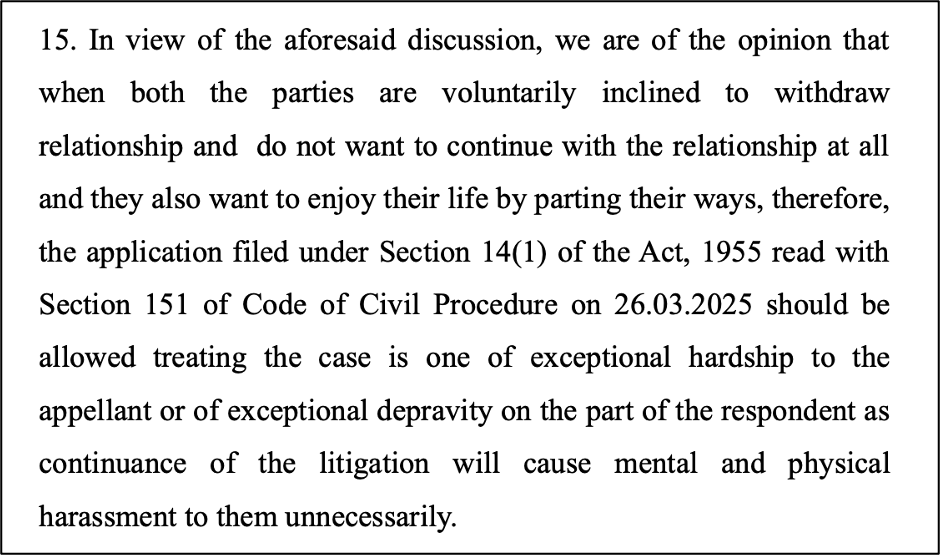
Kolkata HC: Injury not essential to prove negligence in dog attack case
The case, Suman Ray vs. State of West Bengal, involves a petition to quash criminal proceedings against a pet owner who was charged under Sections 289 and 34 of the Indian Penal Code for negligence. The complainant alleged that he was attacked by 10 to 12 of the petitioner’s dogs on a residential rooftop, which caused him to fall and sustain injuries.
The petitioner argued that the case was fabricated and made several points in his defence. He said he owns only one dog and not 10 to 12, as claimed. The medical report noted no obvious external injury, and there was no evidence of the necessary negligence or mens rea. He also claimed that the police investigation was flawed and that the case was an abuse of the legal process.
The State responded by saying that the investigation had collected enough prima facie evidence to warrant a trial. It pointed out that the disputes about the number of dogs involved and the severity of the injuries were questions of fact that could only be decided by a trial court after examining evidence.
The Kolkata High Court agreed with the State and dismissed the petition. Justice Uday Kumar explained that its role was not to hold a mini-trial or settle factual disputes at this stage. The judge clarified that Section 289 of the IPC punishes the probable danger an animal poses due to the owner’s negligence and not only the actual causing of serious injury. Therefore, the absence of obvious external injury did not justify quashing the case at this point. The Court concluded that a prima facie case existed and that the petitioner’s claims were defences to be argued at trial. It ordered that the criminal proceedings should continue.
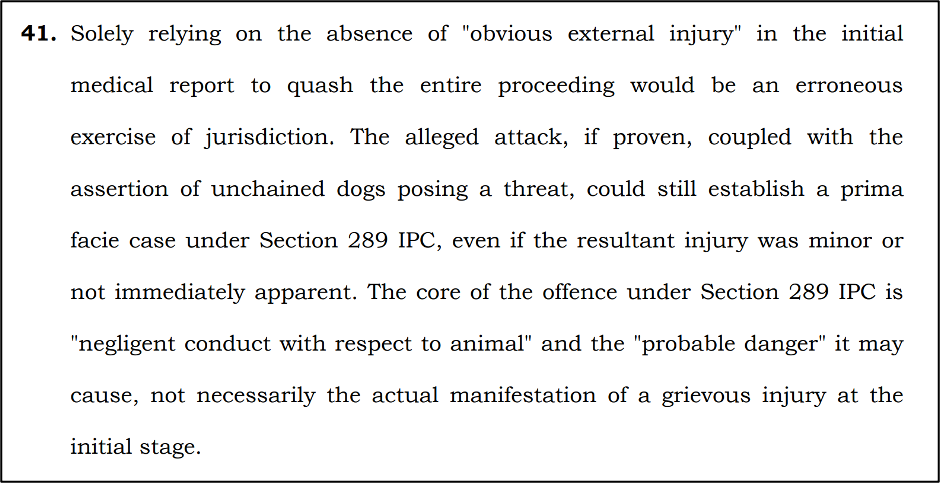
Delhi HC: EMIs and mediclaim policy payment cannot override husband’s legal duty to maintain wife and child
The case, X vs. Y, involves an appeal filed by a husband before the Delhi High Court under Section 19 of the Family Courts Act, 1984, challenging a Family Court order that directed him to pay Rs. 15,000 per month as interim maintenance to his estranged wife and child under Section 24 of the Hindu Marriage Act, 1955. The parties were married in 2009 and separated in 2020. The husband had filed for divorce, during which the wife sought interim maintenance.
The Family Court, after examining income affidavits and financial records, determined the husband’s monthly income to be Rs. 47,128 and awarded Rs. 8,000 to the wife and Rs. 7,000 to the child. The husband contested this, citing various loan EMIs, mediclaim policy premium covering child and wife’s expenses, and his contractual employment. He argued that the wife was educated and capable of earning.
The High Court bench of Justice Navin Chawla and Justice Renu Bhatnagar dismissed the appeal, affirming that voluntary financial liabilities like personal loans and EMIs do not override the statutory obligation to maintain dependents. It emphasised that maintenance is based on actual income and capacity to pay, not just take-home salary after deductions. The Court also clarified that being educated or theoretically employable does not defeat a maintenance claim, especially when the wife is managing health issues and caring for the child.
The Court found no procedural error or legal infirmity in the Family Court’s order and upheld the maintenance award as fair and reasonable.
